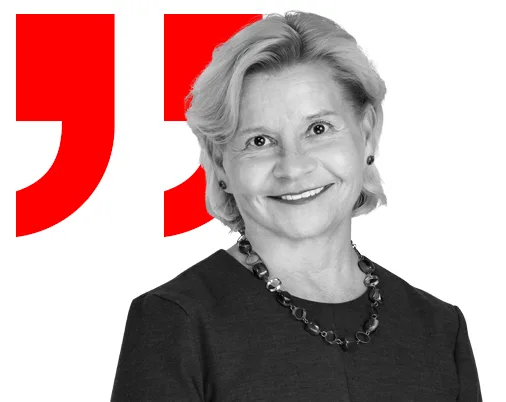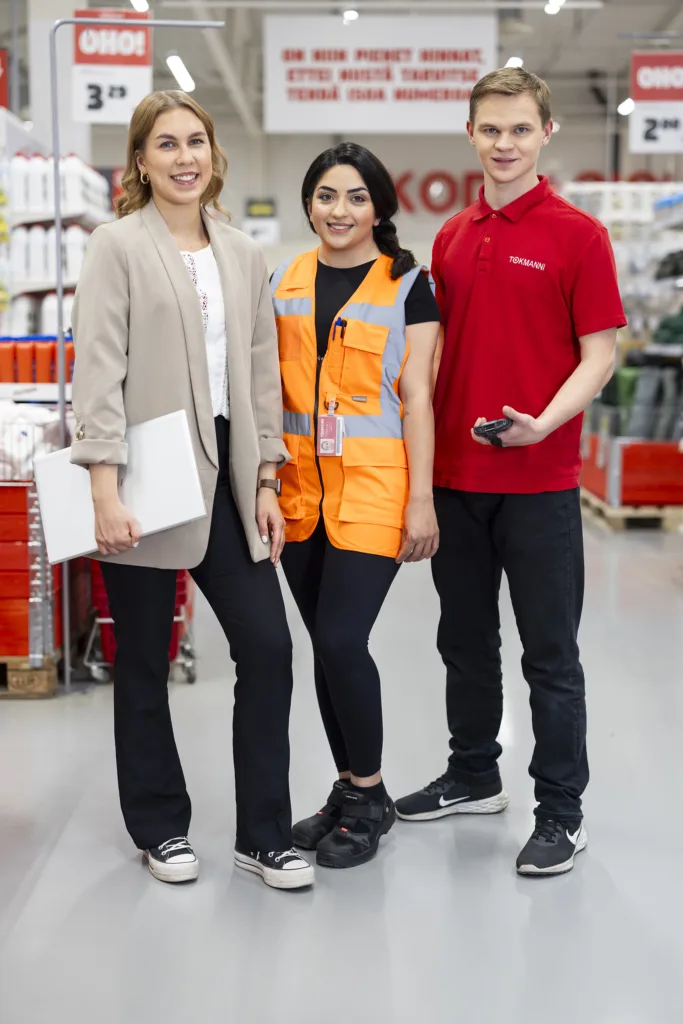
Own workforce

“Our committed and motivated employees are the basis of Tokmanni Group’s success.”
Tokmanni Group succeeds when its employees are healthy and conduct their work tasks safely.
Sirpa Huuskonen, Chief People, Culture and Sustainability Officer, Tokmanni Group
We promote our employees’ well-being, occupational health and safety through smooth work ability and occupational safety processes and day-to-day management.
The goals of these processes are to prevent occupational health and safety risks, increase well-being and prolong the working careers, in other words, to comprehensively and continuously improve occupational health and safety.
Our number of employees grew slightly in 2024 compared to the previous year. At the end of 2024, we had 4,488 employees in Finland, 2,016 employees in Sweden, and 109 employees in Denmark.
We have a delightfully diverse group of people at work. Among our Tokmanni variety discount retail chain and Click Shoes and Shoe House store chains, we together represent over 30 different mother tongues, for example.
In 2024, the accident frequency rate for the Tokmanni Group was 11.15 (no comparison to the previous year). Tokmanni’s accident frequency rate was 9.34 (2024: 13.81) and Dollarstore’s was 16.08 (compensated work accidents reported by 27.2.2025, compensated workplace accidents x 1,000,000 / hours worked). Tokmanni’s absence rate in 2024 was 5.6% and Dollarstore’s was 6.0%.
At the end of 2024, the average number of years of service among permanent employees in Tokmanni was 7.4 (2023: 8.2) and 4.7 in Dollarstore (2023: 4.4). 84% (2023: 82%) of Tokmanni employees and 81% (2023: 84%) of Dollarstore employees held permanent employment contracts. The share of full-time employees was 32% (2023: 33%) at Tokmanni and 22% (2023: 25%) of Dollarstore employees, whereas part-time employees made up 68% (2023: 68%) of Tokmanni employees and 78% (2023: 75%) of Dollarstore employees.
Equal treatment at work
For Tokmanni Group, equality in the workplace means equal job opportunities and fair treatment of its employees and job applicants, as well as guaranteeing non-discrimination to everyone within the company. We respect and value the skills and differences that each employee brings to the workplace. Equal treatment has a positive effect on employees’ well-being, commitment to work, creative problem-solving, innovation, and collaboration. We use gender-neutral job titles.
Two out of our six members of the Board of Directors are women whilst two of our nine members of the Executive Group are woman (at the end of 2024).
Most of us work in our stores
Most of our employees work in the stores or the logistics centres, either on a permanent or fixed-term basis. About 400 of the employees work in the head offices, either in Finland or Sweden. Additionally, we at times employs students as trainees or offers secondary school students the possibility to do their short work practice. During summer holidays, sick leaves and peak seasons, we also use temporary workers from personnel service providers, in addition to summer substitutes.
We consider the perspectives of its workforce in decision-making processes. Direct interaction with our own workforce occurs, for example, through employee surveys (called Pulse surveys), the company’s appraisal process and cooperation meetings with employees’ representatives in accordance with or exceeding demands of national legislation. Additionally, our employees can directly share their opinions with their supervisors, HR, or employee representatives.
We are committed to addressing and resolving potential conflicting interests among employees fairly and transparently. Employees can report conflicts through the whistleblowing reporting channels, by informing their supervisor, or by contacting HR. An independent group investigates all reports. This group consists of individuals who are not involved in the matter. In conflict situations, all parties are heard equally and given the opportunity to present their views. We resolve conflicts through mutual agreement, respecting the rights of all parties, and finding a fair outcome.
Pulssi (Pulse) employee survey
The annual Pulse (Pulssi) survey is answered anonymously, to include also the most vulnerable individuals. Among the employees, some individuals do not speak the local language as their native language, forming a potential barrier for engagement. This is why it is possible to respond to employee surveys in multiple languages (Finnish, Swedish, Danish and English). Communication materials also utilise videos and images to illustrate and enhance message comprehension.
We review the results at least at the company level and actions taken at the Group, company, or possibly even team level. Each store therefore had the responsibility to create its own action and follow-up plan, based on the Pulse (Pulssi) survey results in line with the guidance of the HR. These surveys provide valuable data on employee perceptions and highlight areas for improvement,
Appraisal discussions
Our appraisal discussion process includes at least one annual discussion with the supervisor for all employees. The appraisal discussion can also be partially conducted as a team discussion. During the appraisal discussion, goals are set, the employee’s performance is discussed, and the focus is on the employee’s professional development. This provides an opportunity to give feedback on both sides.
Health and safety observations
We encourage all our employees to report observations related to occupational health and safety. Regular meetings are held at least quarterly with Managers and key employees to discuss current topics.
Effectiveness of stakeholder dialoguetehokkuus
Tokmanni Group’s Human Rights Policy and its commitments ensure that the company operations align with the human rights standards and that the rights of employees are protected and respected in all countries of operation. The Group also collaborates with unions in all matters with potential impacts on employees as required by law and collective agreements.
In addition to Pulse (Pulssi) survey, we assess the effectiveness of engagement with our employees by tracking related key performance indicators (KPIs), such as participation rates and Employee Net Promoter Score (eNPS), over time to monitor progress and identify trends. Thus, we aim to ensure systematic assessment and that the insights gained are used to support our decision-making and improve workplace practices. The eNPS metric was implemented at the Group level for the first time in 2024.
Our vulnerable employee groups, such as people who do not speak the local language as their mother tongue and people with mental well-being challenges, have been considered, especially in dialogue practices. In the Tokmanni store chain, people whose Finnish language skills need improvement have been offered the opportunity to participate in Finnish as a working language training. Interpretation services are also used when necessary. In 2024, we added new subject areas to the comprehensive coaching program for supervisors, such as human leadership, diversity and developing interaction skills. In addition, supervisors in our stores have received training in mental well-being and listening skills.
Channels to raise concerns
If we become aware of or recognises a realised negative impact on our own employees, we immediately begin investigating the matter and make the necessary adjustments to our operations based on the findings. We respect the negotiation procedures in accordance with collective bargaining agreements in conflict situations. Negative impacts and potential remedies are resolved and agreed upon through mutual agreement, aiming to respect the rights of all parties and finding a fair and just outcome.
Negative impact cases are regularly monitored, and effectiveness is assessed, for example, by ensuring that issues are resolved within the company following the due diligence procedures to manage and address human rights impacts as well as provide or cooperate in remediation when appropriate.
We have whistleblowing channels available for all our stakeholders, for anonymous reporting of violations of the Code of Conduct and ethical guidelines, including human rights violations, in accordance with the Directive (EU) 2019/1937. Our employees can access these through internal digital systems and contracted workers via internet websites.
Our employees receive information about the Group’s reporting channels and their operation during orientation and annual Code of Conduct training. Information is also available at any time in internal digital platforms. The awareness and trust in systems are not separately measured but usage is followed by the notices received via above mentioned reporting channels.
CASE: Own workforce | Good induction strengthens an employee’s commitment
When starting out at Tokmanni, each new employee is allocated a sponsor that supports the employee during the first phases of their Tokmanni career. The sponsor welcomes the new coworker and ensures that they have been inducted properly, they have been able to integrate into the work community and they are familiar with their tasks.
Good induction makes employees happier, they learn their tasks faster, and they know how to use their work tools safely. In addition, their impression of the employer is better.
The Tokmanni induction sponsor program was systematised in spring 2021, but Tokmanni has had a culture of sponsorship for a long time. Each region was assigned an induction coordinator who is responsible for training sponsors who work at Tokmanni stores. Each year, the coordinators are informed about principles and practices, and they bring this information back to the sponsors.
Being a sponsor also brings new perspectives and experiences to the workday, and almost always the sponsor learns new things too. A good sponsor is professional, motivated, and has a positive attitude. Being calm and present with the ability to listen and explain things in a simple and clear manner is also important.
Regional Manager Kirsi Koskela previously worked as a Store Manager. At that time, she also worked as an induction coordinator in her region.
“A well-trained individual will be more committed to their employer. Induction can prevent injuries and accidents, and new employees feel more welcome. Of course, the law also obliges us to organise induction,” Koskela notes.
“The Store Manager and sponsor are responsible for planning the induction, but everyone is responsible for their own sectors. Feedback from new employees has been exclusively positive. For me personally, it is important to welcome each new coworker, including interns. They are at minimum new customers, if not employees.”
This article was published in early 2022 and edited in April 2024 and March 2025.

Which sustainability topics would you like us to tell more about?
Tell us, for example, via Tokmanni’s customer service, we would like to hear from you!

